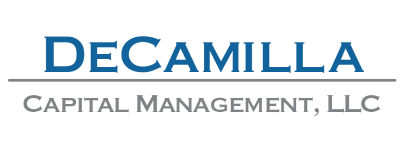HomeResources
Resources

Resources
Disclaimer for Links to External, Third-Party Websites
Links to external, or third-party websites are provided solely for visitors’ convenience. Links taken to other sites are done so at the user’s own risk and DeCamilla Capital Management, Inc. accepts no liability for any linked sites or their content. Linking to an external or third-party site does not imply ownership or endorsement by DeCamilla Capital Management, Inc.

Client Toolkit
We all want to invest for future goals and security, but it can be a challenge to get started. Using the Investment Toolkit, new and prospective DeCamilla Capital clients can review all documents related to the firm’s investment process, approach, and philosophy in a central location.
When you are ready, you can download and print the documents below, read them, and jot down any questions you may have prior to contacting or meeting with a DeCamilla Capital representative.
Investment Documents
Investment Process-A multistage approach
Building a Customized Portfolio with DeCamilla Capital
Form ADV, Parts 2A & 2B
DeCamilla Capital Registered Investment Advisor Disclosure Agreement
Client Management Agreement
Investment Management Agreement between DeCamilla Capital and their Clients

Education Outreach
Placing fiduciary-based investment knowledge & ideas into your hands
Events
Watch for DeCamilla Capital’s next education outreach event.
Coming Soon!


Of Interest to Investors
DeCamilla Capital embraces all aspects of and related information about the investment and financial services sector. Following are subjects that we consider of interest to investors. Items will be updated to reflect evolving topics in investment and finance.
Subjecting All Investment Advice to a Fiduciary Standard
U.S. Department of Labor fiduciary rule proposes that all investment advisors adhere to a fiduciary standard
• Consumer Protection [Feb. 23, 2015, National Public Radio]
• Proposed Rule Definition of the Term Fiduciary; Conflict of Interest Rule–Retirement Investment Advice [Public Comment Begins April 20, 2015]
• Middle Class Economics: Strengthening Retirement Security by Cracking Down on Backdoor Payments and Hidden Fees
• The Effects of Conflicted Advice on Retirement Savings
What Does True Investment Success Look Like?
• The Folklore of Finance, How Beliefs and Behaviors Sabotage Success in the Investment Management Industry
Why WISER Women
• Women’s Institute for a Secure Retirement—Improving the long-term financial security of all women

The Markets
Financial markets are usually exchanges, organizations that carry out the trading of financial securities (e.g., stocks, bonds) or commodities (e.g., precious metals, agricultural goods). They can be a physical location like the NYSE or an electronic system like the NASDAQ.
A wide range of broadcast, digital, and print media outlets cover the ins and outs of market activities domestically and globally. The many intricacies and nuances of investing in these markets cannot be adequately captured on a single webpage.
At DeCamilla Capital, we review daily an array of financial publications such as Barron’s, The Wall Street Journal, The New York Times, Investor’s Business Daily, and routinely tune in to broadcast financial reports. Below are several other multimedia outlets investors may consider when seeking economic, investment, and financial markets information.

Business and markets news, data, analysis, and video to the world

Reporting on business, markets, technology, media, luxury and personal finance

Provides business news, analysis, and stock market data.

Business news

International business, finance, economic and political news, comment and analysis

Original articles on finance, industry, investing, and marketing topics

Financial and Investment Words
Most people have heard the phrase “money talks” – generally stating that “wealth gives power and influence to those who possess it.” Whether that is true or not is up to the individual interpreter.
What is true is that the language of money and finance can be overwhelming. Investors need to understand the basics of financial and investment terminology.
One of the most comprehensive online financial dictionaries is Investopedia with more than 13,000 terms and counting. Best of all it’s free and understandable.



